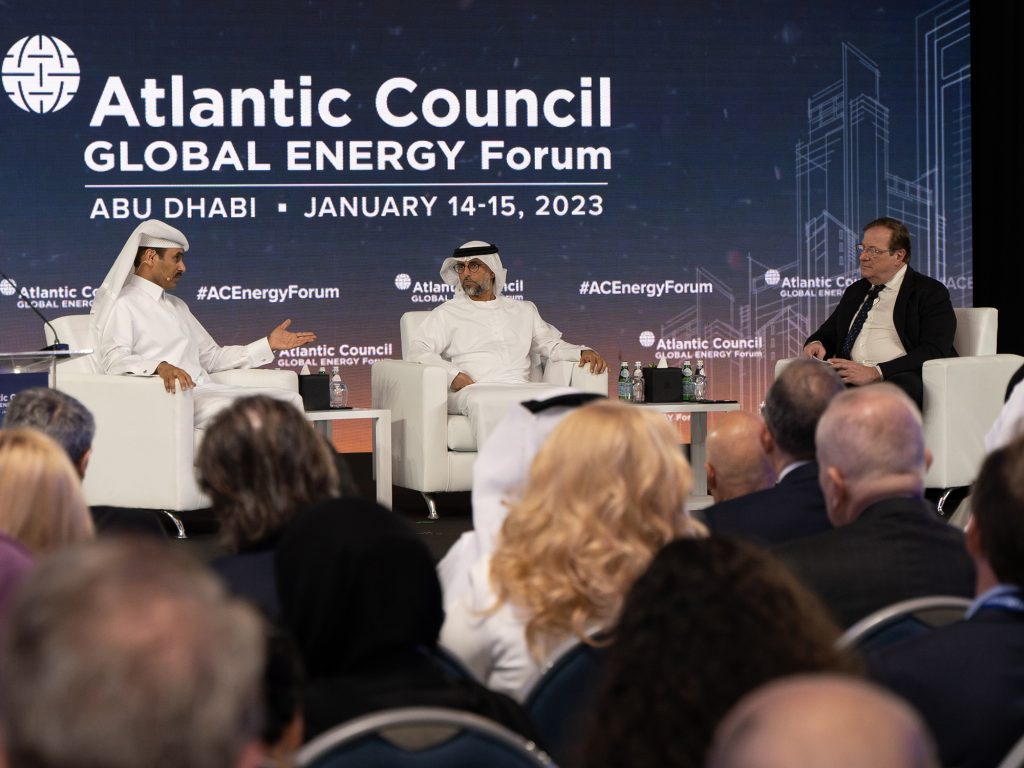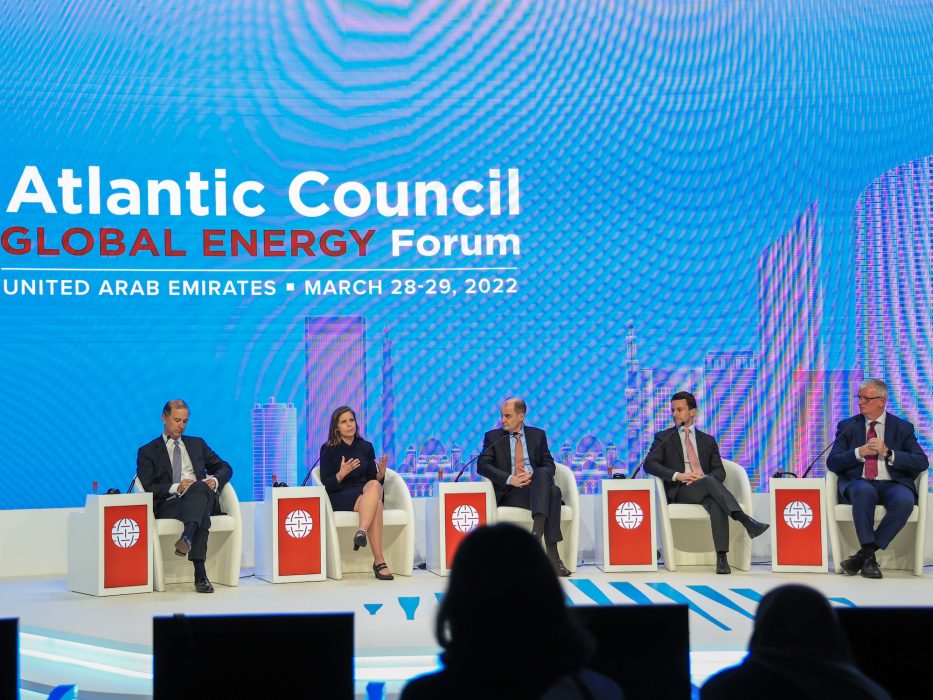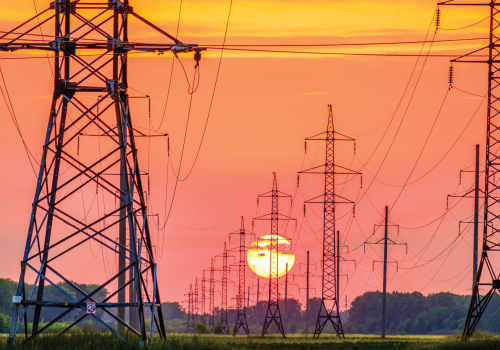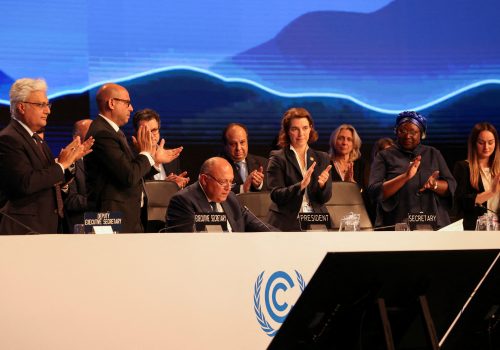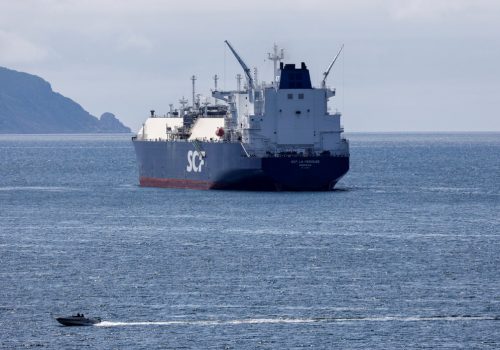Watch the full event
Event transcript
Uncorrected transcript: Check against delivery
Speakers
H.E. Eng. Suhail bin Mohammed Al Mazrouei
Minister of Energy and Infrastructure, United Arab Emirates
H.E. Saad Sherida Al-Kaabi
Minister of State for Energy Affairs, State of Qatar; President and CEO, QatarEnergy
Moderator
Frederick Kempe
President and CEO, Atlantic Council
FREDERICK KEMPE: It’s an honor to be with the two of you today, and thank you for helping us kick this off. Concerns around energy security and improving energy access in the developing world have been at the top of the agenda this year, with natural gas being a major area of attention given Europe’s efforts to rapidly diversify its natural gas imports.
So I actually have two questions. One of them is that we had a quite extraordinary 2022 in the energy world, and a little bit of reflection on that but what you expect for 2023. But then, on world natural gas questions, prices spiked this year but seem to be returning back to earth. And then, within 2023, in your eyes does it reflect an equilibrium of supply and demand balance for gas, or do you foresee in 2023 further imbalances on the horizon in the short term but—or through this year? So a look at the year ahead, a reflection on the year past, with a specific look at what you expect for natural gas. Minister.
MINISTER SAAD SHERIDA AL-KAABI: Well, first I’d like to thank you for hosting me and thank my very good friend His Excellency Suhail for inviting me to this event. It is a pleasure to be back in the UAE with such a distinguished audience.
I think if you, you know, look at the gas supply/demand and what happened last year, it started actually before the [war in] Ukraine, where a lack of investment in the oil and gas sector caused really a shortage in gas. And ahead of the [war in] Ukraine, the oil and gas prices, obviously, were clearly going higher due to lack of supply. And that lack of investment was driven by many factors, including, you know, the bigger push for the green without having a real plan for how the transition is going to happen. So there was a scarcity of investment over about five, six years. And then, when the Ukraine situation happened, you know, a big volume was taken out of the market, and obviously, that would take it even further up.
I think—and you know, 2022, the spike is very obvious why, but 2023, I think it has come down as everybody has witnessed. But you know, the mild winter, I think, in Europe is the biggest cause. And there is storage—I mean, ample storage—but luckily, they haven’t had a very high demand for gas due to the warmer weather. The issue is what’s going to happen when they want to replenish their storages in this coming year and the next year. There isn’t much gas coming into the market until 2025, 2026, 2027. So I think it’s going to be a volatile situation for some time to come.
FREDERICK KEMPE: And prices will be volatile with it, it’ll be going up and down, but—
MINISTER SAAD SHERIDA AL-KAABI: Yeah, prices are a factor of supply/demand. I think some people think that we are very happy for high oil prices and so on. The biggest worry that we would have, I think, as an oil and gas producer is demand destruction, and you can see that there is demand destruction with—whether it’s gas or oil. And, unfortunately, and I think of the wonderful speech that we heard from His Excellency Sultan, [he] talks about what we’re going to do, going forward, and we’re all for what he mentioned.
But you can’t have coal at record highs and say that we are going to achieve our targets. You know, 30 percent of the power in the world thus far uses coal, and all the countries that were calling for coal to be stopped are using it at record levels today.
So I think I we need to take very serious action and I think coal is the biggest emitter by far and I see a lot of [attacks] on oil and gas companies and demonizing oil and gas companies. I don’t see the same attack on the biggest polluter on the planet.
FREDERICK KEMPE: I’m really looking forward to coming back to you about the communication question.
Mr. Minister, you have lived through so much change and so much history since you took over as the minister, everything from OPEC+ to what we experienced last year, rolling off the war in Ukraine.
How do you look at 2022? What do you expect for 2023? And the same question, particularly with a particular focus on natural gas?
MIN. SUHAIL BIN MOHAMMED AL MAZROUEI: Well, first of all, it’s glad to see this crowd. I think probably this is the biggest Atlantic Council energy that we have ever since we started, and I’m grateful for His Excellency and for all of Your Excellencies for coming.
Actually, the—I would build on what His Excellency Saad mentioned. We’ve been talking about the lack of investments and the lack of interest from the financial institutions to finance fossil or oil and gas projects, and part of that is also the lack of understanding [of] what is the future for many countries when it comes to energy strategy, what contributions or what percentages they would have of gas or even the pace of reducing their coal.
It’s not clear. I mean, there are plans but those plans are not concrete and then that unclear long-term strategy by many countries put them in a situation where it’s very difficult for them to commit [to] long-term gas contracts, which has in return made the companies or those who are developing the gas at a very difficult position with their financiers because they would like to see long-term contracts and those long-term contracts are not there.
Everyone [wants] to buy, but they want to buy in a two-year or three-year span, and that is not enough for someone to develop gas. Gas is available and there are huge discoveries in recent history. But the development pace is not there, and the investment is not there.
So that is one of the problems or one of the issues that is causing the problem today. Of course, Russia is a major producer of gas and LNG, and when you shift from one location to another, trying to adjust, that takes time and that’s what happened in 2022 where some of that gas has been relocated to another market and other gas from other markets is [coming] to Europe, especially from the US.
But is that sustainable in the longer run? I think you’d need more collaboration between the European nations on agreeing on the optimization of the [Floating Storage Regasification Units (FSRUs)] that are also limited and also agree on some pipelines. I think one of the things that [contribute] to energy security is pipeline gas, and together with Qatar and with Oman we have established the first regional Middle East pipeline that is secured and made energy security affordable and available for the three countries, and I think in the future—if you ask me about the future, I think we need to do more of these projects.
There are countries [that] require gas and we cannot do everything as LNG. I think [the] state of Qatar and His Excellency personally is involved in some of the largest expansions of LNG. Dr. Sultan as well and ADNOC, they are also increasing their capacity of exporting. But even with that, with those investments, it’s not enough.
Gas has to be available, and it has to be affordable to secure and to become a base load that helps the renewable energy and helps [clean] up the environment and [reach] the COP goals.
And we are committed. We will do the investments. But I think the whole world needs to think about the resources and needs to think about how we enable the companies and the [international oil companies and national oil companies] to produce more gas to make it available and affordable.
FREDERICK KEMPE: Thank you for that answer.
Minister al-Kaabi, I want to come back to your comment about demonization. This is a country that’s one of the—I guess, OPEC’s third largest producer of energy. It’s also a country that’s been a pioneer. Dr. Sultan talked about Masdar in the renewable space at the same time.
In the COP process in the past, the climate community and the fossil fuel providers were rarely in the same room. Are you seeing a change?
The climate community seems to be more open now to, particularly, natural gas as a bridging fuel, more open to nuclear power as well, other solutions in decarbonizing carbon, and the fossil-fuel community is investing billions in new technologies and renewables, et cetera.
Dr. Sultan was talking about a paradigm shift. Is that too utopian to think that that’s where we’re going? Talk a little bit about how you think these two communities can come together and actually accelerate the reduction of emissions, not slow it down.
MINISTER SAAD SHERIDA AL-KAABI: If I can just be a little bit blunt, maybe, about this is the community that was driving the green was living in a dream that they realized they can’t achieve, OK, and, basically, if you want to achieve what we all want to achieve, I think—we’re the hottest place in the world, probably. So climate change affects us more than most. So, for us, it’s very important that we head in that direction. It’s very important that we achieve these goals.
But we need to be realistic about what we can and cannot achieve and we can’t be driven by just political agendas of people wanting to be elected. OK. It should be based on reality, based on what can be achieved. I’m an engineer. You tell me, I want to achieve an objective, I’ll tell you, OK, can I do it per the plan, what’s the budget, and [can] we achieve it at this timeline.
But just to talk about achieving net zero and the majority of the countries that you talk to they talk about net zero and you say how you are going to achieve it, they say we achieve 60 percent, 70 percent of it by 2040 by doing this, this, and that, and the rest is technology improvement.
So that—I’m not a native English speaker but that doesn’t mean we will achieve net zero. It means we will strive to, we’ll try, we’ll see what we can do to achieve it. OK.
So, to me, I think the realization of the need for gas because wind doesn’t blow all the time, solar is not available all day, and technology improvements in storage and so on is going to improve and there are a lot of things that will improve and, hopefully, help us in that scale.
But I think there are two sources that will be needed for the very long time for people that don’t have hydro and other, you know, renewable energies. You need nuclear for those that can afford it and are capable of building it and have the technology. And you need gas. And these two will have to be the baseload for countries for a very long time.
And I don’t agree that gas is a transition fuel. I think it’s a destination fuel until we have a realistic solution that can do away with gas. It’s a destination fuel that you will need for a very long time. And when we say we need more investment in gas—and as His Excellency mentioned, you know, they’re expanding in LNG. We’re building 65 million tons. We’re producing 77 million tons today. We’re building 65 million tons of LNG that has already been [through a flame ionization detector] OK? Now, so almost double. I mean, 48 million tons coming from Qatar and our investment in the U.S. is another, you know, 16 to 18 million tons. So we’re bringing, really, a lot of gas to the market, but it’s not enough.
And you can’t achieve what we need as humanity and the number of people that are going to grow. As His Excellency Dr. Sultan mentioned, we need growth. One billion people today are deprived of basic electricity that we all enjoy. So we need to be fair.
And I think one point I’d like to just add to that on the investment side; it’s very, very, very unfair of some in the West to say that African countries should not invest in oil and gas and they should, you know, remain green or whatever you want to call it while this is a God-given wealth that they can create for their national growth and for their prosperity. And it is oil and gas that is needed for the world. And we should not forget the oil and the petrochemicals and what you need there. People love kayaks. They love the coolers that they take for picnics. There is no renewable that can manufacture that. It’s oil-based solutions that get you there, OK? So it’s plastics and so on that are needed. I know we need to do a lot of work there, but let’s not forget reality of what we need. A lot of stuff that you have around you here, and the decoration and the flooring and all that, is oil and gas. We’re wearing, OK? So let’s be realistic while achieving the goals that we want.
FREDERICK KEMPE: Minister Suhail, I’d love you to build upon what you’ve just heard from your colleague with the question of: The climate community perhaps dreamt dreams that were inachievable, but also from the fossil fuel provider standpoint is enough being done?
MIN. SUHAIL BIN MOHAMMED AL MAZROUEI: No, I don’t think we are doing enough. But there is—there is a wave of new thinking. And I see it more in the IOCs, in the NOCs. Typically, the technology and all of that comes from you, Descalzi, and the others who are here.
But I am really glad to see companies now thinking of reducing their carbon intensity, to see state-owned companies seeking the highest technologies to reduce methane emissions. And that is a kind of a change in the industry that we haven’t seen. We need to remember that the cleanest hydrocarbon is probably produced here in the Gulf. If we compare the carbon intensity of what we produce as a barrel here and you compare it with barrels elsewhere, probably we have the cleanest barrels or the greenest barrels you can find. And that comes at an investment. It doesn’t come free. I mean, us and Qatar and—and same with gas. You could produce gas, but you could produce gas also with the intention in mind to reduce the carbon intensity. And that’s, I’m sure, what QP is doing and Qatargas and what ADNOC is doing.
The fact that we here… Abu Dhabi [walks] the talk and [says] that the only electricity we will use in the field to produce oil is going to come from renewable or clean sources, that’s by itself, it’s a commitment. It doesn’t come free. It comes, I’m sure, at a cost. But that’s the cost that we are willing to do our part. And I’m sure we will see more of these actions.
So we will do our part, but realistically, you need a base load. Until we reach a price for the base load to complement the hundred-percent renewable energy, whether it’s a battery or other technologies, we will need a base-load contributor. And I agree [with] what His Excellency said, for a very long time, gas will be there. Percentage-wise, it may reduce—and it will reduce, but in obsolete numbers, it will increase and it will increase significantly. What is the worry? The worry: with that increase in demand, we will not have enough supply. And gas and oil are finite resources; they are not going to stay there forever. We have seen countries going steeply in decline only—I mean, talking about oil, and gas is like oil—only within the twenty-three countries with OPEC+.
Since 2000, the reduction and the ability to produce is more than 3.7 million barrels. What does that tell you? That tells you that we are in a decline. Many countries, they are in the decline mode. Same with gas I am sure. So not every country has the resources that Qatar has, or [the] UAE has, or Saudi Arabia, or other countries. Many countries have started earlier, and they are [on] the decline more. Same with the United States. How many—how many years? And are we going to have enough batteries or technologies to assume that we will have it, and it’s going to be uniform everywhere? I think that’s a big assumption.
But at the same time, we need to do what Sultan has said, and we are committed to do it as a country. We can afford to do it, and many countries we do. But can we enable and be a platform for inclusiveness, so everyone is enabled to do it? How many companies like Masdar [do] we need? And how many alliances like the one with the United States [do] we need with the one hundred gigawatt?
India will need to install probably five hundred gigawatt in the next twenty to thirty years, and more in China, and many other countries. That’s I think where we are. More renewable energies will be installed, but we need a baseload, and for a base load, we need more investments in gas.
FREDERICK KEMPE: Thank you for that, Minister Suhail.
So Minister Al-Kaabi, I racked my brain last night about how to think about a question that linked the global energy market to the World Cup, and I couldn’t come up with it. And Lionel Messi just couldn’t get into any of my questions. But congratulations anyway on the World Cup.
MINISTER SAAD SHERIDA AL-KAABI: Thank you.
FREDERICK KEMPE: Give us your view of what you foresee in the global gas market that might be preventing the market from reaching equilibrium. Is it the resources? Is it the investment? You know, so much is being demanded of gas right now, so much is being demanded of LNG. If you had told me, you know, two years ago that suddenly Germany would have, within six months, three new import terminals brought into the market by the vice chancellor of Germany, who is the leader of the Green Party—it would have sounded preposterous.
So how do you see the future of equilibrium in the market? And what are the problems in getting there?
MINISTER SAAD SHERIDA AL-KAABI: Yeah, on the German side, we were negotiating with the Germans for about ten years, and suddenly they came to us and said, we want to build terminals. So, you know, the world changes.
I think, you know, the equilibrium will be achieved by hopefully some kind of a mediation or truce or some kind of a political solution where Russia and Europe get things, I think, sorted out, if you will, politically hopefully, and the sooner the better. I don’t think that—this war and this situation will not last forever. And I understand that the Europeans today are saying there is no way we’re going back to Russian gas. We’re all blessed to be able to forget and to forgive. And I think things get mended with time.
And I don’t think some of the countries that were depending 100 percent or, you know, a very large percentage on Russia will not go back to 100 percent or 80 percent or maybe 50 percent. They will diversify and they’ll learn from that situation, and probably have a much bigger diversity. But the Russian gas is going to come back, in my view, to Europe. It is next year? Is it in five years? I don’t know. But once the situation is sorted out. And that, I think, will be a big relief to the whole gas sector and to the whole market in Europe, and will stabilize prices. And again… on a big scale, our project from the United States is going to bring about eighteen million tons starting at the end of 2024 and then really peaking in 2025. And then QatarEnergy’s investment in our, you know, expansions in Qatar, 48 million tons are going to come. The rest are smaller projects that will come a little bit later. But other than that, that’s the volume that’s coming. And if governments and legislators do not promote additional gas investments, as His Excellency Suhail said, if I am being very selfish that’s good for us, but that’s not good for the development.
Watch the full event
Further reading
Fri, Jan 13, 2023
The 2023 Global Energy Agenda
Global Energy Agenda By
The third edition of the Global Energy Agenda provides context for the year that has passed. It features a survey of thought leaders in the energy sector, as well as a series of essays by the leading figures in energy, to set the energy agenda for 2023.
Mon, Nov 21, 2022
The big success and bigger failure of COP27
Fast Thinking By
What other surprises cropped up at the conference? Our experts, who were on the ground in Sharm el Sheikh, are here to weigh in.
Thu, Dec 8, 2022
Securing alternative gas supplies and addressing critical infrastructure gaps in Europe
Issue Brief By Richard L. Morningstar, András Simonyi, Olga Khakova, Paddy Ryan
This issue brief offers recommendations for measures that European countries decoupling their energy supplies from Russia should take to give themselves the best chances of succeeding.
Image: H.E. Eng. Suhail bin Mohammed Al Mazrouei and H.E. Saad Sherida Al-Kaabi speak with Frederick Kempe at the Atlantic Council's Global Energy Forum on January 14, 2023. Photo via the Atlantic Council.
